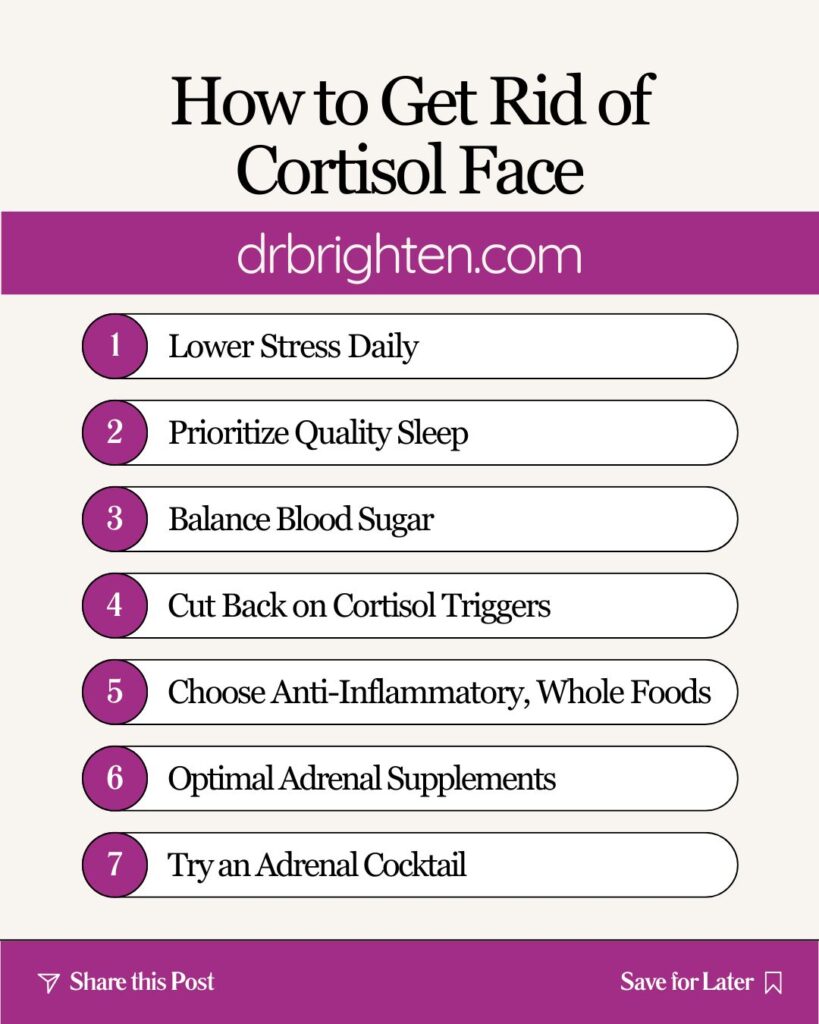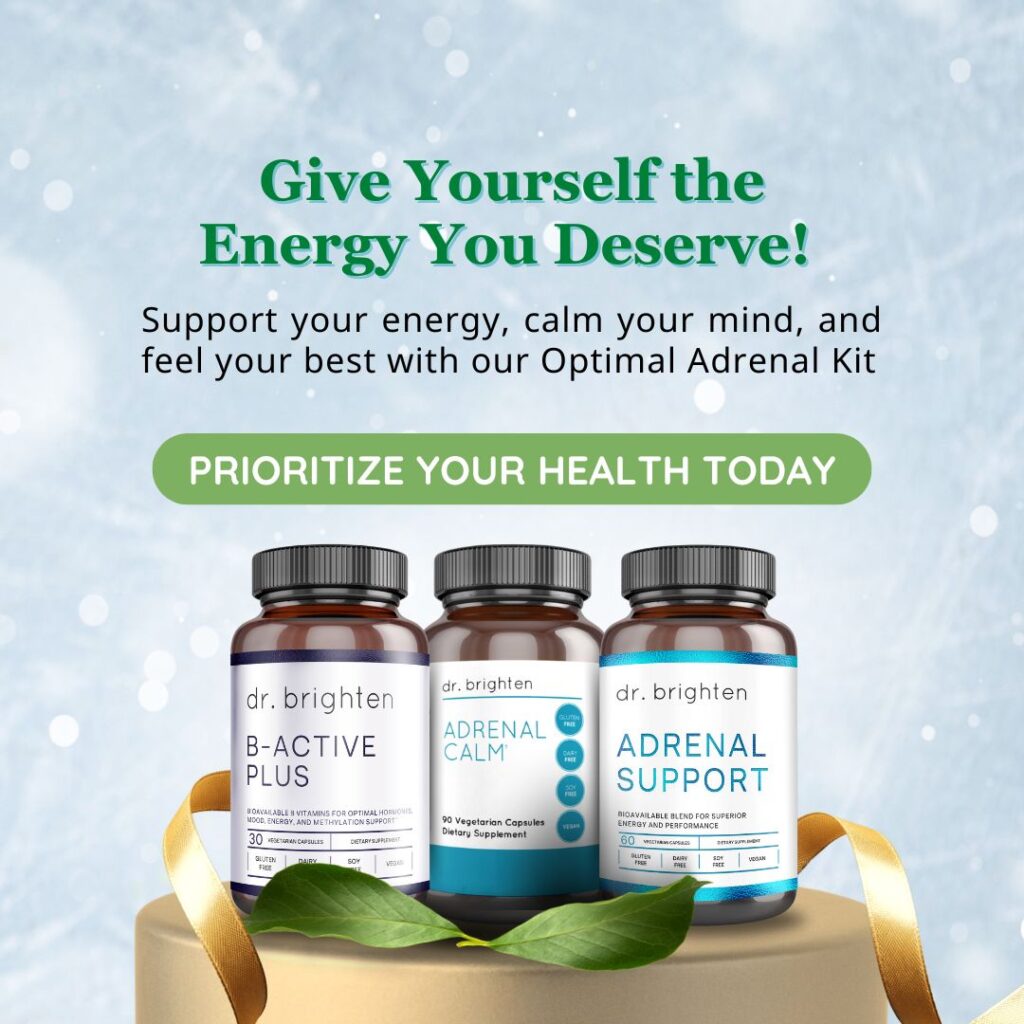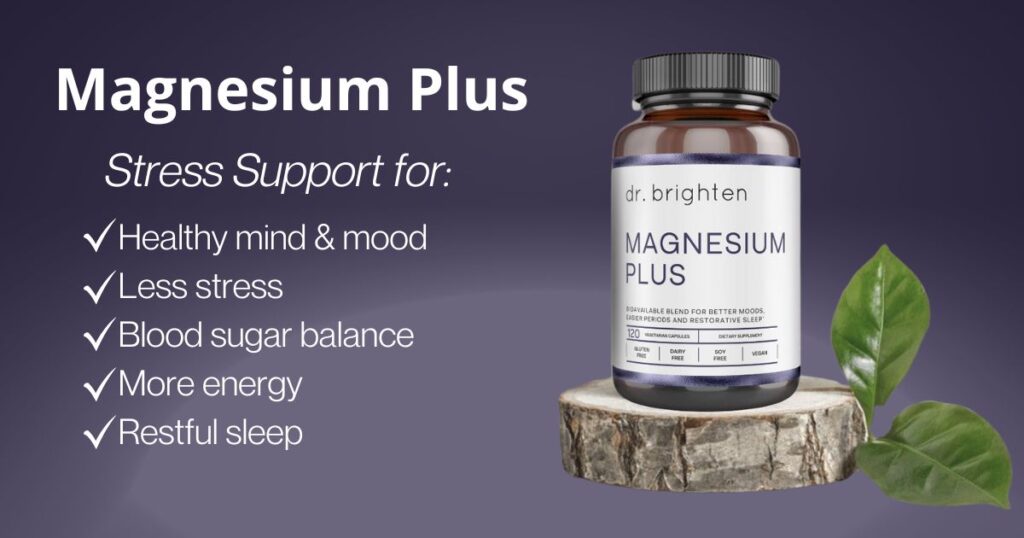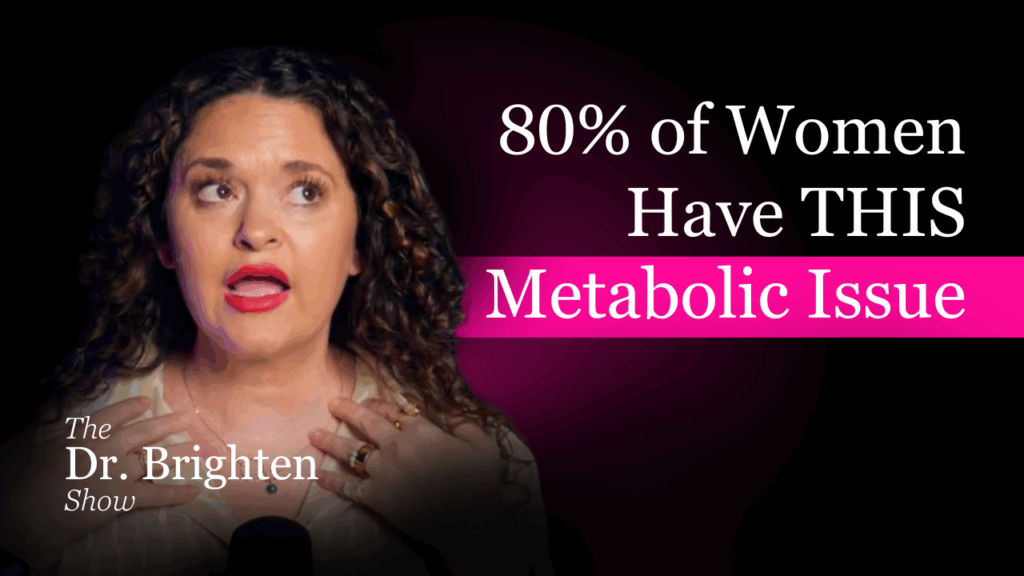If you’ve been feeling stressed and notice your face looks rounder, puffier, or more swollen than usual, you might be dealing with cortisol face. This stress-related facial puffiness happens when cortisol—the body’s main stress hormone—stays elevated for too long. Even low-grade, everyday stress from busy schedules, poor sleep, or overexercising can change how your body stores fat and retains water, making your face look fuller.
The upside? With targeted stress management, sleep improvements, and adrenal support, cortisol face can be reversed and often faster than you think.
You don't necessarily have to experience extreme stress to have high cortisol levels and the side effects that come with it, which can include fluid retention and a puffy appearance.
Chronic stress from a busy life, blood sugar swings, poor sleep, or overexercising can keep cortisol elevated. Over time, this can lead to visible changes in your face and body, which is a sign your adrenal system isn’t getting the support it needs. In fact, even studies show that stressed people often appear less attractive1!
So, what can you do to get rid of cortisol face (ideally, pretty fast)? As you'll learn below, managing stress is key, along with improving your diet, nutrient intake, and sleep patterns.
In this article:
- What Is Cortisol Face?
- What Does Cortisol Face Look Like?
- Who's Most Affected By Cortisol Face (Risk Factors for Developing “Moon Face”?
- What Causes Cortisol Face?
- How To Reduce Cortisol Face
- How to Support Your Adrenals With the “Adrenal Cocktail”
- FAQ: Cortisol Face (Stress Puffiness)
- Bottom Line: Cortisol Face Is Real—But It’s Reversible
What Is Cortisol Face?
Cortisol face is puffiness and swelling in the cheeks, jawline, and under-eyes caused by high cortisol levels from stress, medications, or hormonal imbalances. Reducing stress, balancing blood sugar, and improving sleep can help reverse it, which we’ll discuss in this article.
Cortisol face is also called “moon face,”2, which refers to a distinct roundness, swelling, and/or puffiness of the face that's caused by elevated cortisol levels.
What exactly is cortisol, and why does it cause your face to look puffy? Cortisol is your body’s primary stress hormone. It's released by the adrenal glands in response to mental, emotional, or physical stress.
While we all need a certain amount of cortisol for motivation, energy, and everyday functions3 (including survival!), consistently having high levels—such as when driven by chronic stress, steroid medications4, or even complex trauma—can lead to changes in fat distribution and fluid retention. This can sometimes show up as puffiness, particularly in your face and midsection.
What Does Cortisol Face Look Like?
The most obvious sign of cortisol face (or moon face syndrome) is when your face looks puffier than usual, especially around your cheeks, jawline, or under your eyes5. Having a “moon face” is a visible clue that your stress hormones are out of balance.
If you suspect you have cortisol face, here's what to look for (which can be signs of having high cortisol6):
- Round or puffy cheeks
- Unexplained facial swelling
- Swelling around the eyes or jawline
- A “moon-like” fullness that seems sudden or hard to lose
- Facial flushing (redness) or increased oiliness, which can sometimes cause breakouts
Other clues that you might have high cortisol7 (which can affect not just your face but your whole body) include:
- Fatigue, insomnia, or anxiety
- Weight gain around the belly
- Thinning skin or slow wound healing
- Bruising easily (a sign of Cushing's syndrome8, especially when you have a puffy neck and a worsening upper-back hump)
- Sugar cravings and blood sugar spikes
- Hormonal imbalances, such as irregular cycles or low progesterone
- Having high blood pressure and/or high blood sugar
- Brain fog and changes in cognitive function (due to how cortisol can affect brain health)
Related: The Connection Between High Cortisol Levels and Cognitive Function

Who's Most Affected By Cortisol Face (Risk Factors for Developing “Moon Face”?
People who are most likely to develop cortisol face include:
- Those with conditions like Cushing’s syndrome9, which is a rare endocrine condition that involves long-term elevated cortisol caused by a tumor on the pituitary gland
- Those taking corticosteroid medications, especially prednisone or hydrocortisone cream on the face
- Those with chronic stress or poor adrenal health, which can contribute to HPA axis dysfunction
- Women with hormonal imbalances, such as PCOS or hypothalamic pituitary adrenal axis dysfunction (also called HPA dysregulation or adrenal fatigue)
No one wants to wake up and notice that the appearance of their face has suddenly changed, so it makes sense that stress face can be distressing, particularly when it doesn’t reflect your overall body weight or feels out of your control.
Before you panic, ask yourself if you've been under a lot of stress lately or feeling burnt out.
Keep in mind that your face might look puffy or swollen when you're exhausted, sick, or dehydrated, such as if you've been drinking alcohol or eating lots of salty foods. So, first rule out these causes before assuming you're dealing with high cortisol.
Related: The Connection Between High Cortisol Levels and Cognitive Function
What Causes Cortisol Face?
High cortisol shifts how your body stores fat and retains water. It encourages fat storage in the face, neck, and belly, while also breaking down muscle elsewhere.
Combined with fluid retention and blood vessel changes, high cortisol can lead to the characteristic “moon face” appearance. This happens because cortisol increases sodium retention, which causes the body to hold onto water, including in soft tissues like those in the face.
Cortisol also thins the skin and weakens connective tissue, making puffiness and swelling more noticeable. Over time, these changes can alter your facial structure, giving it a rounder, more swollen look even if the rest of your body remains the same.

Does Hydrocortisone Face Cream Cause Cortisol Face?
Topical steroid creams—like hydrocortisone face cream—can also contribute to moon face10 if used frequently or over large areas. Even though the medication is applied to the skin, it can be absorbed into the bloodstream and mimic the effects of elevated cortisol.
Does this mean you can't use hydrocortisone on your face, and will it always cause swelling? Not necessarily. It can be used occasionally and for short periods, typically under a doctor’s guidance, without major concerns.
But chronic use, especially on thin or sensitive areas like the face, can thin the skin, increase capillary fragility, and contribute to localized swelling and fat redistribution over time. If you notice puffiness, redness, or skin thinning, it may be time to stop and discuss alternative treatments with your provider.
How To Reduce Cortisol Face
Now, onto the good news: With the right strategies, you can reverse cortisol-related puffiness and support your body’s ability to regulate stress hormones. These changes not only help with cortisol levels but also support overall hormone health, energy, and mood. I provide you a brief overview below to help you get started and will explore these in more detail later in the article.
Cortisol face can improve within weeks if you help your body lower stress and rebalance hormones. Here’s an overview of what to do:
- Lower Stress Daily
- Try calming techniques like deep breathing (4-7-8 breathing), yoga, meditation, or journaling.
- Spend 15–20 minutes in nature to lower cortisol naturally.
- Consider adaptogens like ashwagandha or rhodiola, magnesium, and omega-3s to support stress resilience.
- Prioritize Quality Sleep
- Aim for 7–9 hours nightly; keep a consistent bedtime.
- Avoid screens 1–2 hours before bed and consider magnesium glycinate or herbal teas (chamomile, lemon balm).
- Balance Blood Sugar
- Eat every 4–5 hours and include 20–30 grams of protein at breakfast.
- Limit sugar and refined carbs to prevent cortisol-triggering blood sugar spikes.
- Cut Back on Cortisol Triggers
- Reduce caffeine (especially on an empty stomach) and alcohol, both of which raise cortisol and worsen puffiness.
- Reduce caffeine (especially on an empty stomach) and alcohol, both of which raise cortisol and worsen puffiness.
- Choose Anti-Inflammatory, Whole Foods
- Focus on leafy greens, berries, nuts, seeds, and high-quality proteins like eggs, fish, and yogurt.
- Focus on leafy greens, berries, nuts, seeds, and high-quality proteins like eggs, fish, and yogurt.
- Support Your Adrenals With Key Nutrients
- Consider supplements like my Adrenal Support (with ashwagandha and rhodiola), Adrenal Calm (L-theanine and lemon balm), and B-Active Plus (active B vitamins) to reset cortisol levels.
- Consider supplements like my Adrenal Support (with ashwagandha and rhodiola), Adrenal Calm (L-theanine and lemon balm), and B-Active Plus (active B vitamins) to reset cortisol levels.
- Try an Adrenal Cocktail
- A mix of orange juice (vitamin C), sea salt (sodium), and cream of tartar (potassium) can replenish electrolytes lost to chronic stress.
1. Prioritize Stress Reduction
Chronic stress is the root driver of elevated cortisol and can also contribute to other hormonal imbalances. To calm your nervous system, try daily practices that help shift your body into a more parasympathetic (“rest and digest”) mode.
- Gentle movement and regular exercise like walking, yoga, or tai chi can lower cortisol11 without overstimulating the system. Take it easy on very intense workouts that drain you, and focus on slower, less intense exercise until you feel better.
- Deep breathing techniques, such as box breathing or 4-7-8 breathing, can calm your adrenal response and nervous system relatively quickly. Practice them daily, perhaps along with meditation, to get better at calming yourself down and noticing when you're feeling stressed or overwhelmed.
- Journaling or gratitude writing helps reframe stressful thoughts and gives you tools to cope with anxiety. It's one of the best ways to reduce emotional reactivity and help you make healthier decisions.
- Spend at least 15–20 minutes outdoors and in nature per day, which has been shown to lower cortisol and reduce inflammation.
- Consider adaptogenic herbs and supplements that can help manage stress, such as ashwagandha (which helps balance cortisol and support sleep12), omega-3s, and magnesium (which has been shown to support cortisol metabolism13 and has relaxing effects). Omega-3s, such as my Omega Plus formula, can help reduce symptoms of burnout, lower morning cortisol secretion14, and generally support brain and mental health.
For additional help dealing with stress, burnout, and fatigue, check out: 8 Ways to Prevent Holiday Fatigue & Lower Stress.
2. Get Enough Good-Quality Sleep
Poor or inconsistent sleep throws your cortisol rhythm off, causing higher levels in the evening and lower levels in the morning (when you actually need energy).
- Stick to a regular sleep-wake schedule, ideally even on weekends. Make sure you head to bed at a time that allows you to get 7 to 9 hours of sleep each night. For more dealing with sleep issues, check out: Which Hormones Affect Sleep? The Hormone-Sleep Connection Explained.
- Dim screens and lights at least 1–2 hours before bed to support melatonin production. Do something else, like reading or journaling, just before going to sleep.
- Consider natural sleep aids like magnesium glycinate or herbal teas (like lemon balm or chamomile) if you’re having trouble winding down.
3. Balance Blood Sugar
Blood sugar crashes signal to your body that it’s in danger, spiking cortisol to raise glucose. The goal is to keep your blood sugar steady by eating enough (as crash dieting can raise cortisol levels) and choosing whole foods.
- Eat balanced meals with protein (including 20 to 30 grams with breakfast), healthy fats, and fiber every 4–5 hours.
- Avoid skipping meals, especially in the morning, which can set the stage for cortisol spikes all day.
- Limit the amount of added sugar, sweetened drinks, and refined grains you eat.
- Add cinnamon or apple cider vinegar to meals to support insulin sensitivity.
Related: Carbs, Cortisol, and Perimenopause: The Real Path to Feeling Forever Strong with Liz Wolfe and How to Fix a Hormone Imbalance —5 Hormones & Foods to Support Them
4. Limit Caffeine and Alcohol
Caffeine, especially on an empty stomach or in excess, stimulates cortisol and can worsen anxiety or puffiness. Try switching to green tea or matcha, which offer a gentler lift with antioxidants.
Alcohol interferes with sleep and increases cortisol after its initial sedative effects wear off. Reducing your intake, such as sticking to 1–2 drinks per week (or at most, one drink per night), can support hormone balance and reduce facial swelling.
Read more on How Alcohol Affects Your Hormones
5. Cut Back on Ultra-Processed Foods
High-sugar, high-sodium, and artificial ingredient-laden foods can worsen inflammation and place more stress on your gut and adrenal system.
Focus instead on whole, nutrient-dense foods rich in antioxidants and electrolytes, as well as protein and healthy fats, like:
- Leafy greens and other veggies
- Berries and fresh fruit
- Legumes and beans
- Nuts and seeds
- Proteins like eggs, yogurt, fish, grass-fed meat, and poultry
6. Support your Adrenals with Targeted Nutrients
In addition to lifestyle changes, you can nourish your adrenals with formulas designed to provide electrolyte balance, adaptogenic herbs, and essential vitamins and minerals. One example is my Optimal Adrenal Kit, which includes:
- Adrenal Support: Contains adaptogens like ashwagandha and rhodiola to support cortisol regulation and energy, stabilize cortisol, and support HPA axis function. These herbs can also help you feel more balanced overall, focus more easily, and get better sleep.
- Adrenal Calm: A non-hormonal blend of phosphatidylserine, L-theanine, and calming botanicals including lemon balm, ashwagandha, and valerian root to soothe your nervous system, help you feel calmer, and balance cortisol production.
- B-Active Plus: This formula features essential B vitamins in their coenzymated (active) forms, which means they’re easier for your body to absorb and use right away, which is key during times of stress when nutrient demands are higher. B vitamins help support your adrenal glands, which produce cortisol, and can also help regulate your body’s stress response, support neurotransmitter production (like serotonin and GABA), and help support energy, methylation, and nervous system health.
These supplements, when practiced consistently, can help your body reset cortisol levels and gradually reduce facial swelling, so you feel (and look) more like yourself again.
They're especially helpful for those experiencing stress-driven symptoms like insomnia, fatigue, or cortisol face, particularly during perimenopause or when focusing on recovery from burnout.
How to Support Your Adrenals With the “Adrenal Cocktail”
The adrenal cocktail15 is a popular drink designed to support adrenal health by replenishing key minerals that are lost during stress.
More specifically, an adrenal cocktail provides sodium, potassium, and vitamin C16, which can help restore electrolyte balance, support healthy cortisol production, and reduce feelings of fatigue or dizziness often associated with adrenal dysfunction.
These nutrients work together to nourish the adrenal glands, stabilize blood pressure, and promote a more balanced stress response.
Many people find that drinking an adrenal cocktail mid-morning or mid-afternoon helps prevent energy crashes and keeps them feeling steadier throughout the day. For best results, pair it with a whole-food diet and other stress-reducing practices.
A classic adrenal cocktail recipe includes:
- 1/2 cup unsweetened orange juice (a good source of vitamin C)
- A pinch of sea salt (which provides sodium)
- 1/4 tsp cream of tartar (high in potassium)
While there haven't been many studies that have specifically looked at this recipe's effects on cortisol face, it's worth trying to see if it gives you an energy boost. You can also obtain these electrolytes (and others, like magnesium) from foods including:
- Bone broth, pickles, and fermented foods for sodium
- Avocados, bananas, sweet potatoes, and coconut water for potassium
- Oranges, leafy greens, strawberries, bell peppers, and kiwi for vitamin C
- Pumpkin seeds, spinach, almonds, and dark chocolate for magnesium
FAQ: Cortisol Face (Stress Puffiness)
Yes. Cortisol face—sometimes called “moon face” or stress face—is a real condition where chronic stress or high cortisol levels cause facial puffiness, swelling, and changes in fat distribution.
Cortisol face is caused by elevated cortisol, your body’s primary stress hormone. Chronic stress, poor sleep, blood sugar swings, or steroid medications (like prednisone or hydrocortisone) can increase cortisol, leading to fluid retention, fat redistribution, and puffiness.
Common signs of cortisol face include:
– Puffy or rounded cheeks
– Swelling around the eyes or jawline
– Facial flushing or redness
– Increased oiliness or breakouts
– A sudden, “moon-like” fullness that doesn’t match your overall body weight
If you’re under chronic stress, feel fatigued, have belly weight gain, or notice other high-cortisol symptoms (insomnia, anxiety, sugar cravings), your puffiness is likely stress-related. However, rule out other causes like dehydration, high-salt intake, or illness before assuming it’s cortisol face.
For stress-related puffiness, most people see improvement within 2–6 weeks with consistent stress reduction, better sleep, and adrenal support. If caused by steroid medications or Cushing’s syndrome, recovery may take longer and require medical guidance.
People most at risk include:
– Those with chronic stress or adrenal dysfunction
– People taking corticosteroid medications
– Women with PCOS or hormonal imbalances
– Individuals with Cushing’s syndrome
Yes. Lifestyle changes—like managing stress, balancing blood sugar, getting 7–9 hours of sleep, reducing caffeine and alcohol, eating anti-inflammatory foods, and supporting adrenal health with nutrients or adaptogens—can help restore cortisol balance and reduce puffiness.
Adaptogens like ashwagandha and rhodiola, calming nutrients like magnesium and L-theanine, and active B vitamins can help regulate cortisol and support adrenal health. Omega-3s also help reduce stress-related inflammation.
Topical steroid creams can cause facial puffiness if used long-term or over large areas because they can be absorbed into the bloodstream and mimic high cortisol effects. Short-term or occasional use, under a doctor’s guidance, is generally safe.
The best prevention is to keep cortisol balanced long-term by:
– Managing stress with daily relaxation techniques
– Maintaining a consistent sleep schedule
– Eating balanced, nutrient-dense meals
– Avoiding excessive caffeine, alcohol, and ultra-processed foods
– Supporting adrenal health during stressful periods with targeted nutrients
Bottom Line: Cortisol Face Is Real—But It’s Reversible
- If your face doesn’t look like you lately, it’s not in your head. Cortisol face is a real physical manifestation of internal stress and hormonal disruption.
- If you're very stressed, tired, and burnt out, high cortisol can lead to swelling, weight gain, and puffiness due to its effects on fat tissue and fluid levels.
- How can you get rid of cortisol face? Lower stress and focus on giving your adrenals the support they need, including with a healthy diet, rest, and supplements.
References
- https://pubmed.ncbi.nlm.nih.gov/23697641/ ↩︎
- https://pubmed.ncbi.nlm.nih.gov/38494065/ ↩︎
- https://www.cedars-sinai.org/blog/what-is-cortisol.html ↩︎
- https://www.ncbi.nlm.nih.gov/books/NBK538239/ ↩︎
- https://pmc.ncbi.nlm.nih.gov/articles/PMC9163469/ ↩︎
- https://news.cuanschutz.edu/department-of-medicine/cortisol-face ↩︎
- https://my.clevelandclinic.org/health/articles/22187-cortisol ↩︎
- https://www.ncbi.nlm.nih.gov/books/NBK551526/ ↩︎
- https://health.osu.edu/health/skin-and-body/is-cortisol-face-real ↩︎
- https://www.mayoclinic.org/diseases-conditions/cushing-syndrome/symptoms-causes/syc-20351310 ↩︎
- https://www.sciencedirect.com/science/article/pii/S0306453022001846 ↩︎
- https://journals.lww.com/md-journal/fulltext/2019/09130/an_investigation_into_the_stress_relieving_and.67.aspx ↩︎
- https://pubmed.ncbi.nlm.nih.gov/33030273/ ↩︎
- https://www.sciencedirect.com/science/article/abs/pii/S0306453019303488 ↩︎
- https://health.clevelandclinic.org/what-to-know-about-adrenal-cocktails ↩︎
- https://www.webmd.com/balance/stress-management/adrenal-cocktail ↩︎




